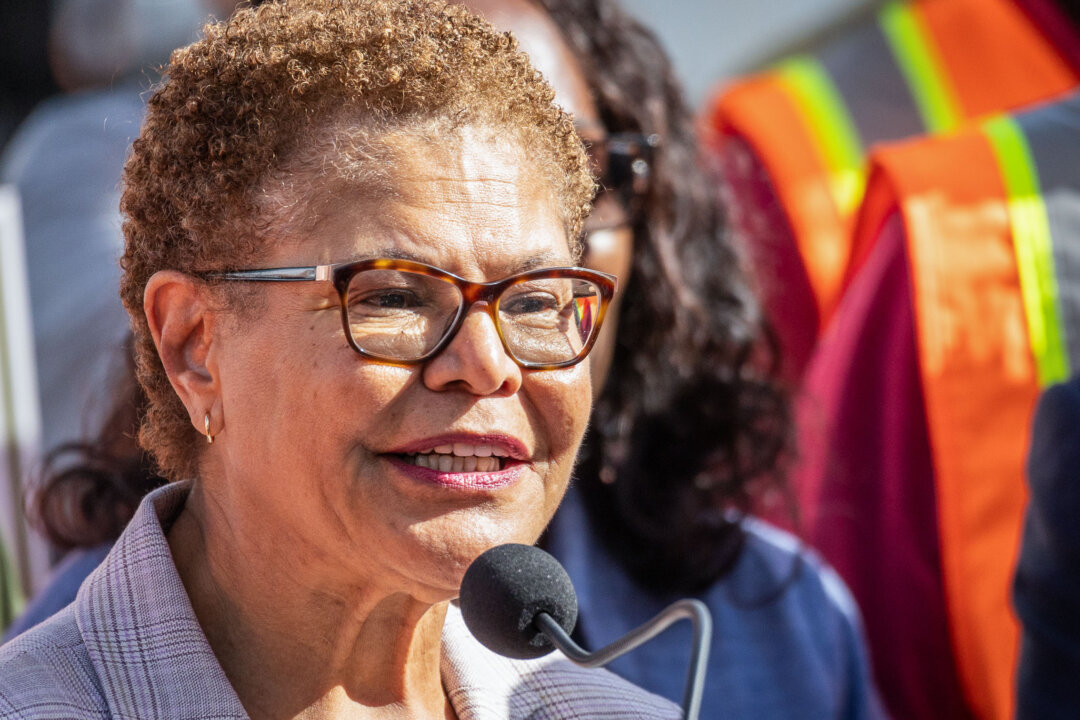‘I imagine that the council will be voting on sanctuary cities hopefully very, very soon,’ Los Angeles Mayor Karen Bass said.
Los Angeles Mayor Karen Bass said on Monday that her city doesn’t have a law officially designating it as a “sanctuary” for illegal immigrants and that this should be changed quickly before President-elect Donald Trump assumes office.
Trump has vowed to carry out mass deportations of illegal immigrants and said he would push Congress to adopt legislation outlawing sanctuary cities, which enact policies that shield illegal immigrants from federal immigration authorities.
In a Nov. 11 interview on KNX News, a local radio station, Bass said past policies related to the status of Los Angeles as a sanctuary were never codified into law. She pledged to push for a City Council vote that would formally designate Los Angeles as a sanctuary city before the end of the year.
“I imagine that the council will be voting on sanctuary cities hopefully very, very soon,” she told the outlet. “We will stand with the immigrant community and whatever policy they put forward, we will make sure that people in Los Angeles are not hurt and families are not separated.”
The City Council approved a motion in July 2023 calling on various city departments to take steps for Los Angeles to formally become a sanctuary city, which would prohibit city cooperation with federal immigration authorities.
Later, in September 2024, several City Council members introduced a motion for a new sanctuary city law to legally codify Los Angeles’ status as a sanctuary city. The law has not yet returned to the council for a vote.
In addition to advocating for the City Council to finalize and enact the law before Trump assumes office, Bass also expressed doubt that the president-elect’s pledge to deport millions of illegal immigrants could be implemented.
Trump, who won the race for the White House vowing a vast crackdown on illegal immigration, said last week that his incoming administration has “no choice” but to press ahead with the deportations, regardless of the cost.
“It’s not a question of a price tag,” Trump told NBC News on Nov. 8, adding that “really, we have no choice.”
“When people have [been] killed and murdered, when drug lords have destroyed countries,“ Trump continued. ”And now they’re going to go back to those countries because they’re not staying here. There is no price tag.”
It’s unclear how many illegal immigrants there are in the United States, with estimates ranging from around 10 million to more than 20 million and beyond. American Immigration Council, an immigrant advocacy group, recently estimated that the cost of deporting 13 million immigrants residing in the United States illegally could total $968 billion over a little more than a decade.
Trump recently tapped Tom Homan, former acting director of U.S. Immigration and Customs Enforcement (ICE), to serve as the incoming administration’s border czar in charge of mass deportations. Homan said in an October interview that the scale of the deportations would depend on the available budget, detention space, and officers assigned to the project. After Trump nominated Homan to oversee border security, the former acting ICE chief said that the effort would prioritize the removal of criminals and gang members who are in the country unlawfully.
In the meantime, Homan urged other illegal immigrants to self-deport, saying it’s just a matter of time before they’re caught and removed from the country.
“Criminals and gang members get no grace period,” Homan told Fox News on Nov. 11. “While we’re out prioritizing the public safety threats and national security threats, if you want to self-deport, you should self-deport because, again, we know who you are, and we’re going to come and find you.”
Trump has also vowed to use federal power against sanctuary cities. During a campaign speech in North Carolina at the end of September, Trump said he would push Congress to pass a law banning sanctuary cities nationwide.
In 2017, Trump signed an executive order that called on federal agencies to withhold funds from sanctuary jurisdictions. The order made federal money to state and local governments conditional upon their giving immigration officials access to their jails and advance notice when illegal immigrants were being released from custody.
Shortly after taking office, President Joe Biden rescinded Trump’s executive order.

